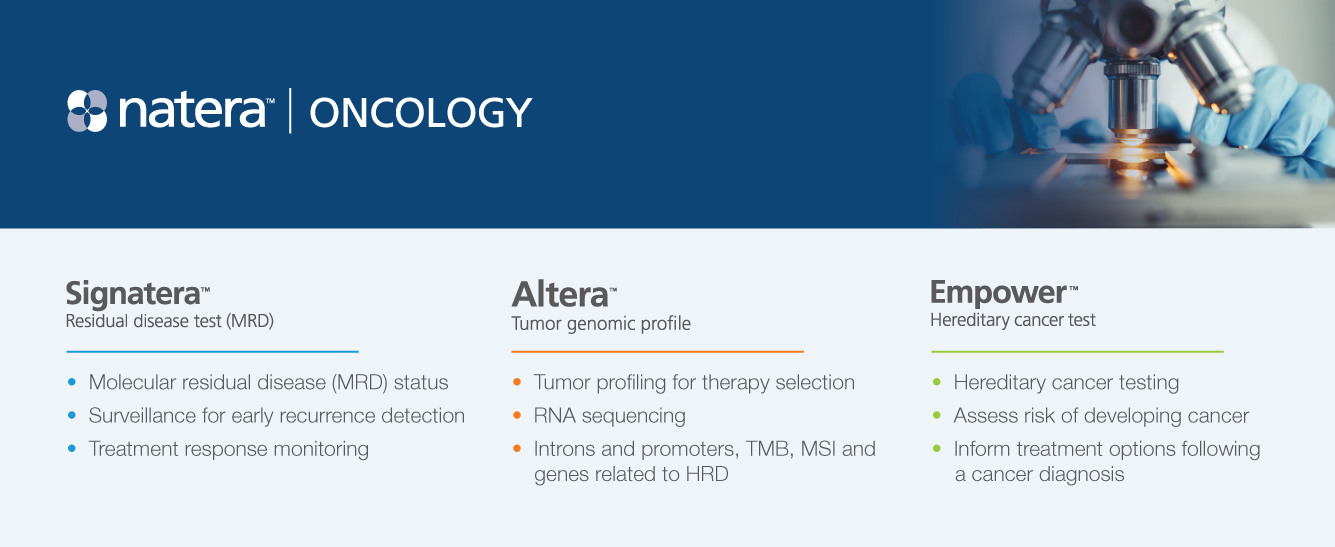Setting the standard for MRD testing
Learn about our expanding body of data in solid tumor malignancies to be presented at the 2024 American Society of Clinical Oncology (ASCO) Congress on May 31-June 4, 2024. Signatera™ Residual Disease test is the most widely validated and extensively published MRD assay with broad patient access to help answer important clinical questions along the entire continuum of care.
Visit us at booth #13047 to learn more about Signatera™ or contact us here.
Learn about our expanding body of data in solid tumor malignancies
We are presenting important new data at the 2024 American Society of Clinical Oncology (ASCO) Annual Meeting, demonstrating the clinical utility and performance of Signatera™ Residual Disease (MRD) test for patients with various solid tumor types.
June 1, 2024
-
Longitudinal circulating tumor DNA (ctDNA) analysis during treatment (Tx) of locally advanced resectable (LAR) gastric or gastroesophageal junction (G/GEJ) adenocarcinoma (ADENOCA): the PLAGAST prospective biomarker study
Poster #4028 Poster Bd #8Esophageal - Poster presentationAziz Zaanan, Hôpital Européen Georges Pompidou -
Prognostic and predictive value of ctDNA-based MRD and actionable biomarkers in patients with resectable colorectal cancer: CIRCULATE-Japan GALAXY
Poster #3609 Poster Bd #272CRC - Poster PresentationYoshiaki Nakamura, Department of Gastroenterology and Gastrointestinal Oncology, National Cancer Center Hospital East -
Association between Circulating Tumor DNA (ctDNA) and Recurrence-Free Survival (RFS) in Patients (pts) with Resected Stage III Melanoma - an Exploratory Analysis of SWOG S1404
Abstract #9564 Poster Bd #348Melanoma - Poster PresentationMichael LaPelusa, The University of Texas MD Anderson Cancer Center
June 2, 2024
-
Genomic alterations in early-onset versus average-onset stage IV colorectal cancer
#3586 Poster Bd #249CRC - Poster PresentationEric Lander, Division of Hematology/Oncology, Vanderbilt University Medical Center -
ctDNA monitoring for breast cancer at high risk of recurrence: Interim analysis of JCOG1204A1
Poster #518 Poster Bd #110Breast - Poster PresentationYoichi Naito, Department of General Internal Medicine, National Cancer Center Hospital East -
Impact of circulating tumor DNA (ctDNA) surveillance on clinical care for patients with stage I-III breast cancer: Findings from a multi-institutional study
Abstract #549 | Poster Bd #141Breast - Poster PresentationMarla Lipsyc-Sharf, UCLA Health Jonsson Comprehensive Cancer Center
-
Longitudinal Evaluation of Circulating Tumor DNA (ctDNA) as a Prognostic Biomarker to Detect Minimal Residual Disease (MRD) in Testicular Cancer
Poster #5034 Poster Bd #352Testicular - Poster PresentationRebecca Hassoun, Indiana University Simon Comprehensive Cancer Center -
Longitudinal analysis of circulating tumor DNA in localised and metastatic urothelial cancer
#4587 Poster Bd #282Bladder - Poster PresentationAdanma Ayanambakkam, Stephenson Cancer Center, University of Oklahoma Health Sciences Center -
Personalized circulating tumor (ct)DNA for monitoring disease status in HPV-negative head and neck squamous cell carcinoma
Abstract #6056 Poster Bd #372HSNCC - Poster PresentationGlenn Hanna, Department of Medical Oncology, Dana-Farber Cancer Institute
June 3, 2024
-
Randomized phase III study comparing suspension or continuation of PD-1 Pathway Blockade for patients with advanced non-small-cell lung cancer (SAVE study: JCOG1701)
Abstract #TPS8659 Poster Bd #517bLung - Poster PresentationYasushi Goto, Department of Thoracic Oncology, National Cancer Center Hospital -
Predicting response to neoadjuvant therapy (NAT) in patients (pts) with early-stage breast cancer (BC) using circulating tumor DNA (ctDNA) testing
Abstract #TPS8659 Poster Bd #517bBreast - Oral PresentationMridula George, Rutgers Cancer Institute of New Jersey -
A targeted panel of actionable high risk hereditary cancer predisposition genes can identify patients with pathogenic/likely pathogenic variants (PVs) irrespective of meeting established NCCN testing criteria
Poster #10596 Poster Bd #123HCT - Poster PresentationSarah Lee, NYU Langone Medical Center
-
Prognostic utility of ctDNA dynamics in the monarchE trial of adjuvant abemaciclib plus endocrine therapy (ET) in HR+, HER2-, node-positive, high-risk early breast cancer (EBC)
Oral Presentation: Breast CancerHall B1
Keith
Patient
Natera’s Oncology Portfolio
A single tissue source upfront provides a comprehensive genomic profile

Learn about Signatera for your clinical trial
Well-designed and successful clinical trials help facilitate earlier “go/no go” decision-making. A trial with Signatera can ultimately enhance the R&D pipeline productivity and impact label expansion of approved oncology drugs to new treatment settings.
Why Partner with us?
-
Experienced team with Global reach: CE Mark, three FDA Breakthrough Device Designations, 8 Non-Significant Risk (NSR) determinations
-
>60 Natera IP assets covering ctDNA MRD and monitoring
-
Clinically validated across multiple solid tumors, Signatera has shown to predict relapse in >98% of patients without further treatment*
